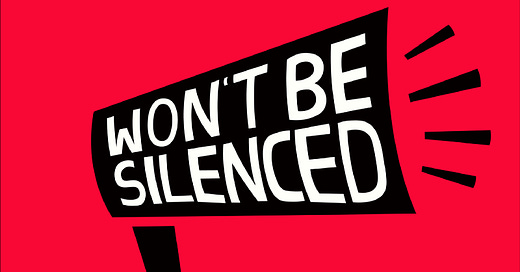*First published on Sept 22nd 2020 medium.com**

When someone says they’re afraid of being called out it’s because they know they’ve done something wrong and they could be called out for it. Think about that. They know they’ve hurt someone but instead of trying to fix it, they spend their time being afraid that they’re going to be publicly exposed for it.
That means they care more about their public image than not harming others.
People don’t understand how much energy and pain it takes for a person to call someone else out. It doesn’t just “happen”. They’re not being “malicious”. They’re trying the very last thing they can possibly do to stop the harm.
This is how a call out works: When someone has been hurt by a person, they try talking to that person. They try this multiple times. They even ask friends to talk to that person and explain why their behavior is harmful. They send educational resources to that person. They spend time going through the resources with that person to help them learn. They talk to them again and again. They beg that person to listen. The entire time, they are fighting that person’s gaslighting, victim blaming, and emotional manipulation tactics. They continue taking abuse while making all efforts to address the problem. And after all that, their efforts still fail because the person who harmed them never wanted to change.
That’s why a call out isn’t about changing the person who caused the harm. It’s about warning others so they are not harmed the same way. It’s also a warning to others to not cause this same harm. It’s education dearly bought at the expense of that harmed person’s mental and emotional health.
That’s how a call out works.
So if someone says “I’m afraid of being called out” ask them why. What do they know they did wrong? Who have they hurt? How long have they known they’ve caused harm and done nothing about it?
Sometimes a person might try to correct the harm they’ve caused but their methods don’t work. That’s because instead of listening to the person they’ve harmed and doing the things that person wants to heal the situation, they try their own methods and demand that the person they harmed go along with that. That’s called emotional manipulation, victim blaming, and gaslighting. It’s also positioning themselves as the victim while pretending like the person they’ve harmed is the problem.
Such a person needs a call out.
So consider why someone would say: “I’m afraid of being called out.” What are they actually trying to tell people? How do they want people to respond?
They want the people to respond by comforting them. They want people to reassure them that they don’t need to be called out and that, in fact, call outs are bad. The most dangerous part is this: They’re making a preemptive strike against the person they’ve harmed so that if they are ever called out by that person, no one will listen because they’ve already been told to believe that “call outs are bad”. That’s erasure, victim blaming, gaslighting.
They are saying that call outs are bad even as they are publicly calling out “call out culture”. They’re literally doing what they’re complaining about because they know call outs work. They see no irony in that at all. They are choosing to dis-empower the people they’ve already harmed to protect their own reputations.They are also giving a weapon to others to dis-empower even more people who have been harmed. In this way, patriarchal violence continues to spread.
It’s important to recognize when someone is gaslighting you to know these tactics and work to interrupt them as soon as possible. They might well come from the people you care about most.
If you are called out because you’ve harmed someone, be grateful that they cared enough to expend that much energy to correct you. You have no idea what it cost them. And if you hear someone saying “I fear call outs” you now know what to do.
Here we are, almost three years post #MeToo, still having to learn about the necessity of call outs. That is because some people you trust, who should know better, are terrified that their public image will suffer. That’s why they’re taking the only tactic survivors have to defend themselves and they’re crushing it.
Don’t let them.

Resources
National LGBT Hotline: 1-888-843-4564
Hotline for 2SLGBTQIA+: 1-519-752-HELP (4357)
National Sexual Assault Hotline: 1–800–656–HOPE (4673)
National Domestic Violence Hotline: 1–800–799-SAFE (7233)



